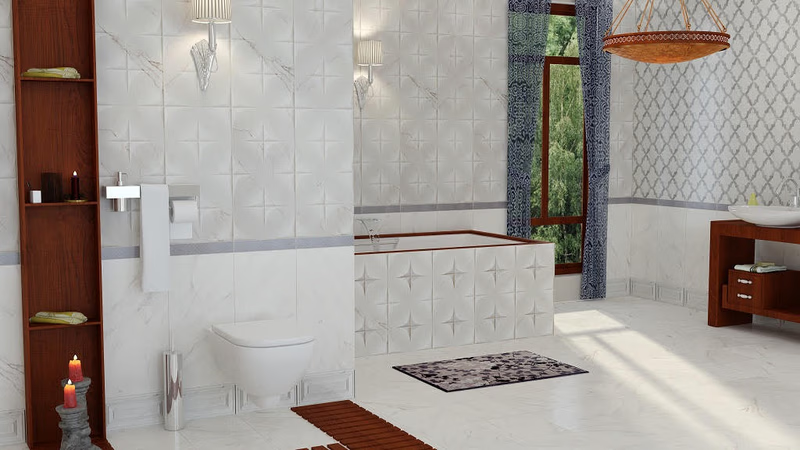
Durable ceramic tiles enhance aesthetics and functionality in spaces.
Ceramic tiles are known for their durability and longevity. They can withstand heavy foot traffic, resist scratches, and are highly resistant to wear and tear. When properly maintained, ceramic tiles can last for many years, making them a cost-effective flooring option. Ceramic tiles are highly resistant to water, making them suitable for areas prone to moisture, such as bathrooms, kitchens, and laundry rooms. They do not absorb water, which helps prevent mold, mildew, and water damage. Ceramic tiles are relatively easy to clean and maintain. Regular sweeping or vacuuming and occasional mopping with mild detergent are usually sufficient to keep them clean. Additionally, glazed ceramic tiles have a protective layer that makes them resistant to stains, making maintenance even easier.
Ceramic tiles come in a wide variety of sizes, shapes, colors, and patterns, allowing for endless design possibilities. They can be used to create different styles, from contemporary to traditional, and can be installed in various patterns to achieve specific aesthetics. Ceramic tiles are a hygienic choice for flooring and wall coverings. They do not harbor allergens, dust mites, or pet dander, making them ideal for individuals with allergies or respiratory sensitivities. Their non-porous surface also inhibits the growth of bacteria and fungi. Ceramic tiles have excellent heat resistance, making them suitable for areas that may be exposed to high temperatures, such as kitchens or around fireplaces. They do not burn or emit toxic fumes when exposed to fire. Ceramic tiles are free of harmful pollutants and provide a healthy environment for your family to prepare and enjoy meals.
- Absence of Volatile Organic Compounds (VOCs): Some VOCs emitted from non-ceramic building products can lead to a variety of health problems. Ceramic tile has zero VOC.
- No allergenic substances: Since the ceramic tile is inorganic and its surface is hard-baked, it is unacceptable for bacteria, fungi, mold and other irritants and dust mites (tiny worms). does not absorb This is especially important if someone in your family has allergies.
- Formaldehyde-free: Some wood products may contain formaldehyde. Certain levels of formaldehyde can trigger asthma and other respiratory disorders, but ceramic tiles do not contain formaldehyde.
- Polyvinyl chloride (PVC) free: PVC is a resin used in some vinyl flooring and is regularly the subject of concern by health experts and manufacturers. Ceramic tiles are free of PVC.
- No plastic: Ceramic tiles do not contain plastic and have none of the health or environmental concerns associated with plastic.
Maintenance of ceramic tiles is very low. Unlike many other flooring options, ceramic tiles offer options that include:
- Stain Resistant: Your kitchen is sure to see a lot of food and liquid splashes. But ceramic tiles are not easily stained!
- Water resistant: Spilled liquids can ruin other types of flooring.
- Scratch Resistant: Dents, scratches, and nicks often seen in other flooring are not a threat to ceramic tile floors, even after years of heavy traffic.
- Resistant to bacteria: ceramic tiles resist the growth of bacteria.
- Antimicrobial: Antimicrobial options can suppress and even kill harmful microorganisms such as mold, fungus, bacteria, and viruses.
- Easy to clean: Ceramic tiles can be easily cleaned by just sweeping and/or washing with water.
Some of the advantages of porcelain slabs include the following:
- Creating a feeling of wideness of view and more space due to the large dimensions of these ceramics.
- Unified presentation of the design due to the extent and fewer lines.
- The possibility of using it in facades and other outdoor spaces due to greater resistance and strength.
- Applicable in all kinds of architectural styles.
- Being hygienic due to the presence of fewer clauses.
- Reducing installation time and saving time.
- Can be designed and cut to make practical components and decorative items for the environment.
Ceramic tiles are made from natural materials, primarily clay, which is an abundant resource. They are non-toxic and do not emit volatile organic compounds (VOCs) or other harmful substances, contributing to better indoor air quality. Additionally, ceramic tiles can be recycled or reused at the end of their life cycle. Ceramic tiles can help maintain a comfortable indoor temperature. They have good thermal conductivity, which allows them to absorb and retain heat. This property makes them compatible with underfloor heating systems, increasing energy efficiency. Ceramic tiles are hypoallergenic, as they do not trap or release allergens. This makes them a suitable choice for individuals with allergies or asthma, as they minimize the presence of dust, pollen, and other allergens in the living environment.
-
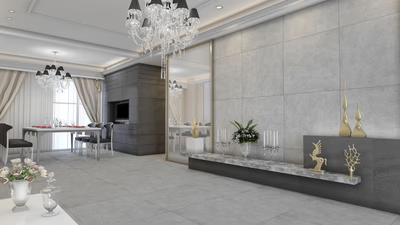
The price and quality of ceramic tiles are influenced by the materials used and the manufacturing processes. Higher-quality tiles, made from premium clay and advanced techniques, tend to be more durable and visually appealing. Thicker tiles are generally more robust, while thinner options may be more affordable but less durable. The surface finish, ranging from matte to glossy, also affects pricing; high-quality finishes ensure longevity and resistance to stains. Intricate designs and unique colors can increase costs due to specialized production methods. While aesthetic appeal is important, buyers should prioritize quality over price to avoid wasting money on inferior products. Ceramic tiles are a cost-effective flooring option for kitchens due to their durability and low maintenance costs compared to alternatives like vinyl or wood. For construction manufacturers or suppliers, purchasing directly from factories can lead to cost savings and a wider selection of products.
By eliminating middlemen, buyers can access better prices for ceramic tiles. Established brands often command higher prices due to their reputation for quality, but newer brands may offer competitive options without compromising on standards. Overall, understanding the factors that influence tile pricing can help consumers make informed decisions.
-
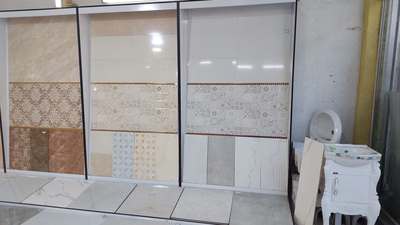
Ceramic tiles are made from clay and inorganic materials, fired at high temperatures, making them durable and versatile for various applications. They are commonly used in residential and commercial settings for flooring and wall coverings due to their aesthetic appeal and ease of maintenance. The manufacturing process involves shaping clay into tiles and firing them in kilns, resulting in a strong product that is resistant to water, stains, and scratches. Ceramic tiles can last many years with proper care, making them a popular choice for both functional and decorative purposes. They come in various shapes, sizes, colors, and patterns, offering extensive design options. Glazed ceramic tiles feature a protective glass layer for added durability, while unglazed tiles provide slip resistance suitable for wet areas. The historical significance of ceramic tiles dates back to 4000 BC in Egypt, highlighting their long-standing role in architecture. Their importance extends beyond aesthetics; they also contribute to environmental health by preventing moisture penetration.
-

Ceramic tiles are versatile materials widely used in both residential and commercial settings due to their durability, moisture resistance, and aesthetic appeal. They are ideal for high-traffic areas like kitchens, bathrooms, and entryways. In addition to flooring, ceramic tiles serve as wall coverings, countertops, and decorative elements in various spaces. Their chemical resistance makes them suitable for industrial applications as well. The lightweight nature of ceramic slabs reduces the structural load on buildings while allowing for diverse design options. Digital printing technologies enable the creation of unique patterns and textures, enhancing their visual appeal. Hygienic properties further contribute to their popularity over other materials like stone or cement. With a vast array of colors and designs available, ceramic tiles can be tailored to meet individual preferences in both traditional and modern architecture.
They are also used outdoors in patios and pool areas due to their weather-resistant qualities. Overall, ceramic tiles offer a combination of functionality and style that makes them a preferred choice in construction projects across the Middle East.
-
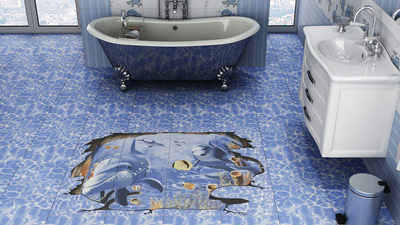
Ceramic tile production involves several key processes, starting with the selection and processing of raw materials such as clay, feldspar, and quartz. These materials are blended in precise proportions to create a homogeneous mixture. The forming process can be achieved through dry pressing or extrusion, shaping the tiles into their desired forms. After forming, tiles undergo drying to eliminate moisture, followed by glazing to enhance appearance and functionality. Glazing is applied using various methods and provides a protective finish. The critical firing process transforms the raw ceramic into a durable structure at high temperatures ranging from 1,000 to 2,500 degrees Fahrenheit. This step is essential for achieving the desired strength and color of the tiles. Post-firing, tiles are inspected for quality control, ensuring dimensional accuracy and surface integrity.
Any defective pieces are discarded before the final cutting and edge treatment processes are performed to prepare them for installation. Finally, tiles are packaged securely for transportation. The production of ceramic tiles is influenced by technological advancements that improve efficiency and quality.
-
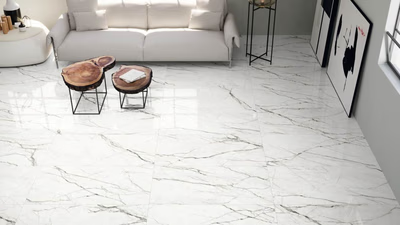
Ceramic tiles have a rich history dating back to ancient Mesopotamia around 4,000 BCE, where they were used for decorative purposes. Ancient Egyptians also utilized tiles adorned with colorful designs in tombs and palaces. The Greeks and Romans advanced tile art, using them for mosaics and in public buildings. The Islamic Golden Age saw the emergence of intricate geometric patterns and Arabic calligraphy in tile designs, particularly the blue and white "azulejos. " The Renaissance period revived ceramic tile production in Europe with new techniques like maiolica. In the Middle East, the tile industry transitioned from manual production to modern factories by the mid-1930s, significantly boosting exports. Iran"s ceramic industry ranks sixth globally, contributing to its economy through foreign currency earnings. The Industrial Revolution further mechanized tile production, making it more accessible.
Today, advancements in technology allow for diverse designs and finishes in ceramic tiles. "
-

Ceramic tiles offer numerous advantages, making them a popular choice for flooring and wall coverings. Their durability allows them to withstand heavy foot traffic and resist scratches, ensuring longevity when properly maintained. They are water-resistant, making them ideal for moisture-prone areas like kitchens and bathrooms, while their non-porous surface prevents mold and mildew growth. Easy maintenance is another key benefit; regular cleaning requires minimal effort. The variety of sizes, shapes, colors, and patterns available allows for versatile design options that can suit any aesthetic preference. Additionally, ceramic tiles are hygienic as they do not harbor allergens or bacteria, making them suitable for individuals with allergies or respiratory issues. They are free from harmful substances such as VOCs, formaldehyde, and PVC, contributing to a healthier indoor environment. Their excellent heat resistance makes them safe around high-temperature areas without emitting toxic fumes.
Furthermore, ceramic tiles can enhance energy efficiency due to their thermal conductivity properties. Overall, the combination of durability, low maintenance needs, aesthetic versatility, and health benefits positions ceramic tiles as an excellent flooring option in various settings.






